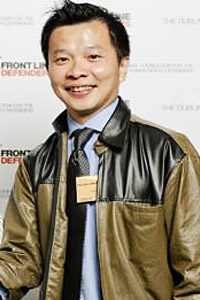
Just a month ago, Thailand celebrated the United Nations Human Rights Council's appointment of Vitit Muntarbhorn, a Thai international law professor, as the first independent expert on protection against violence and discrimination based on sexual orientation and gender identity (SOGI).
However, his mission to investigate abuses against lesbian, gay, bisexual and transgender people worldwide is now under threat, as African countries last week tabled a resolution in New York, aimed at blocking the appointment.
This proposed resolution will come up for a vote tomorrow. If passed, it will set a dangerous precedent. It will undermine not only the independence and integrity of the council, but also the credibility of the whole UN system.
The resolution calls into question the legal basis of SOGI. Botswana's ambassador to the UN, Charles Ntwaagae, said on behalf of African countries that the council should not be looking into "sexual orientation and gender identity". He insisted that the "two notions are not and should not be linked to existing international human rights instruments."
However, this claim has been rebutted time and again. The legal basis for SOGI is clear and unassailable: universality and non-discrimination. In particular, Article 1 of the Universal Declaration of Human Rights (UDHR) states: "All human beings are born free and equal in dignity and rights." As simple as that.
There are also claims that SOGI is not included in the grounds for protection under the UDHR or other international human rights instruments which only mention "race, colour, sex, language, religion, political or other opinion, national or social origin, property, birth or other status". But they conveniently leave out the preceding "without distinction of any kind, such as..." which indicates that the list is not meant to be exhaustive.
In fact, SOGI has long been within the international human rights system. In 1994, the UN Human Rights Committee ruled that the Tasmanian sodomy law discriminated against Nicholas Toonen, an Australian gay activist, and violated his right to privacy guaranteed by the International Covenant on Civil and Political Rights. This landmark case is also a reminder that the protection of lesbian, gay, bisexual, transgender and interest (LGBTI) is not an issue only in developing countries.
Similarly, the UN human rights framework protects refugees, disabled persons, indigenous people, and more recently, old persons and persons with albinism, despite the fact that these are also not explicitly mentioned in the above mentioned list. The remedy for selective opposition to LGBTI protection -- itself a discrimination -- is to go back and read Article 1.
Therefore, it is clear that Thailand has the legal and moral duty to LGBTI communities in the country and elsewhere to vote in unequivocal support of Prof Vitit and his mandate.
However, no matter which way the UN votes tomorrow, Thailand is in a unique position and has a much greater role to play beyond this resolution.
As a fellow global south country, Thailand shares with African countries concerns about development, peace, public order and social cohesion. Like in Thailand, gender non-binary and sexually non-conforming people thrived in many pre-colonial African societies.
As Uganda's Foreign Minister Sam Kutes admitted, "It is true that people of that orientation, even in Africa, have been there for centuries." Thailand can and must reach out to African states and share our experiences, challenges and concerns on the protection of LGBTI, with an acknowledgement that our own understanding of the issue is still evolving, and that no country has all the solutions, and each has a unique trajectory of human rights development.
The lessons from our less-than-stellar records can help demonstrate that universal human rights are indeed indispensable in building a peaceful and prosperous society -- a common goal of all developing nations. Honesty about our own shortcomings and the challenges ahead can open a venue for dialogue and bridge the global LGTI rights divide.
This will not be an easy task, but it is possible. In fact, Africa is already on its way to catching up. Many shared African values are universal values. Comparable to the Buddhist concept of interconnectedness, there's nothing more inclusive and powerful than Ubuntu -- I am because you are; there is no them, only us.
Few people speak of compassion better: "No one is born hating another person because of the colour of his skin, or his background, or his religion. People must learn to hate, and if they can learn to hate, they can be taught to love, for love comes more naturally to the human heart than its opposite."
And few speak of human rights more strongly: "For to be free is not merely to cast off one's chains, but to live in a way that respects and enhances the freedom of others."
These are sayings of an African and one of the greatest human beings who ever lived. Nelson Mandela's beacon still shines over Africa and the world in the enshrinement in the South African Constitution of non-discrimination on the basis of sexual orientation.
His kind of moral courage may be unusual in the horse-trading sphere that is the United Nations. But that's precisely why it is all the more needed in an increasingly divisive world. It's now time that Thailand rise up to the challenge.
Paisarn Likhitpreechakul is a co-founder and board member of Foundation for SOGI Rights and Justice.
